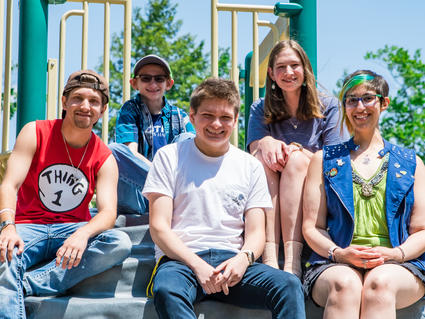Hereditary Cancer Syndromes
DCEG researchers study a range of inherited syndromes that may predispose affected individuals and their family members to cancer. These include inherited bone marrow failure syndromes, Li-Fraumeni Syndrome, dyskeratosis congenita, and other inherited cancer predisposition syndromes.
They use an interdisciplinary clinical research approach to systematically investigate cancers related to these syndromes.
DICER1 Natural History Study
Pleuropulmonary blastoma (PPB) is a rare tumor of the lung. Research has shown that PPB may be part of an inherited cancer predisposition syndrome caused by changes in a gene known as DICER1. The PPB Cancer Study is an observational study of children with PPB and their families.
Familial Blood and Lymph Node Cancers Study
DCEG investigators have been studying the causes of familial blood and lymph node cancers for over 30 years. Ongoing advances in genetics, anticipated applications of advanced technologies, and data from families have allowed research efforts to expand.
Familial Chordoma Study
Chordoma is a rare bone cancer that develops at the base of the skull, in a vertebra, or at end of the spine. DCEG investigators are studying families with multiple relatives with chordoma.
Familial Chronic Lymphocytic Leukemia Study
DCEG investigators are studying families with multiple cases of chronic lymphocytic leukemia (CLL), the most common leukemia in adults in the Western Hemisphere.
Familial Melanoma Studies
DCEG researchers are searching for melanoma susceptibility genes in melanoma-prone families.
Familial Testicular Cancer Study
DCEG investigators are conducting the Familiar Testicular Cancer Study to research the genetic causes of testicular cancer.
Inherited Bone Marrow Failure Syndromes
The inherited bone marrow failure syndromes (IBMFS) are a group of rare genetic blood disorders. DCEG investigators are leading a clinical study to better understand how cancers develop in persons with IBMFS.
Li-Fraumeni Syndrome Study
Li-Fraumeni Syndrome (LFS) is a rare, inherited disorder which leads to a higher risk of certain cancers. NCI has evaluated families with LFS since the syndrome was first recognized in 1969. DCEG is now expanding this research through a clinical study and participation in a multi-institutional collaboration.
Multidisciplinary Etiologic Studies of Hereditary Breast/Ovarian Cancer
DCEG researchers have been studying the Hereditary Breast/Ovarian Cancer (HBOC) syndrome since the 1960s. This study is now closed to patient enrollment, and researchers are analyzing previously collected data.
Waldenström's Macroglobulinemia Study
Waldenström's macroglobulinemia (WM) is a rare type of tumor that belongs to a group of disorders called lymphoproliferative diseases. DCEG researchers are leading a study to determine what causes WM to sometimes develop in two or more family members.
